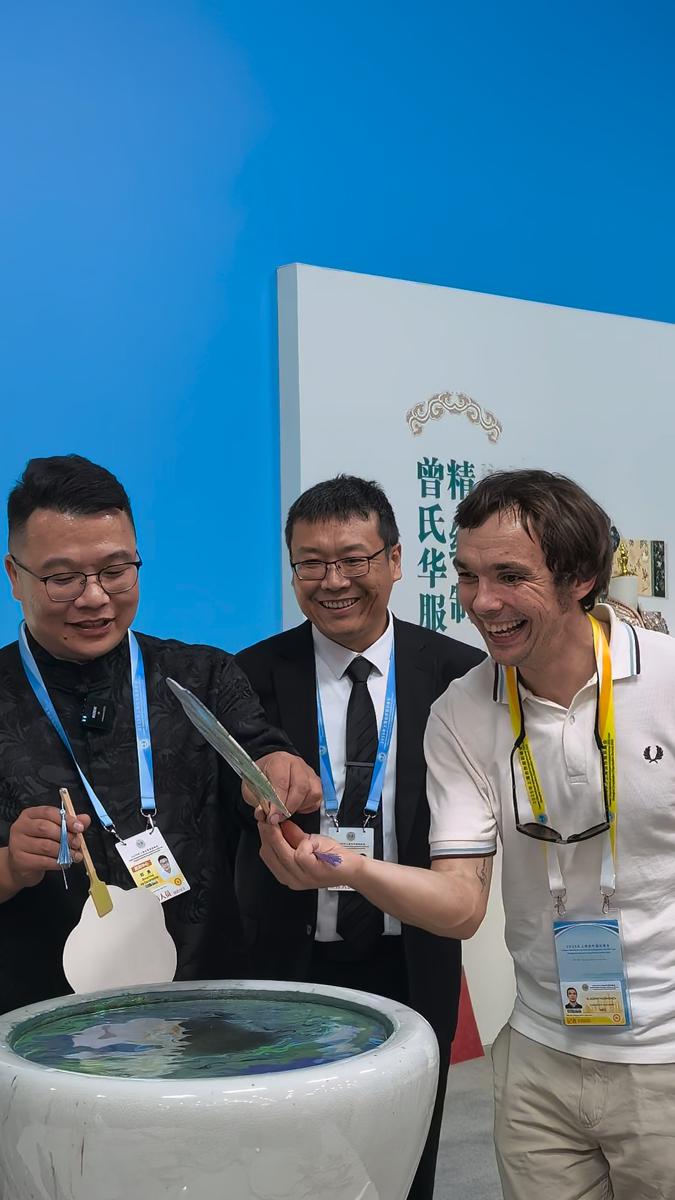Tianjin puts its intangible culture on display for SCO guests


Foreign guests got the chance to sample a number of examples of intangible cultural heritage (ICH) in Tianjin during their stay in the city for the 2025 Shanghai Cooperation Organization (SCO) Summit. Among these were the national-level ICH Yangliuqing New Year Paintings and the Tianjin municipal-level ICH jasmine tea blending craft.
Italian journalist Clementi Marco tried making a Zhengshi lacquered fan in the ICH interactive display room in the Media Center. "I have not only seen high-tech robots, but also experienced interesting ICH projects. Tianjin's culture is a combination of tradition and the future," he said.
"As an inheritor of China's ICH, I hope to showcase its techniques, as well as the Chinese culture and wisdom embodied in them, to guests from all over the world," said He Ailian, a fourth-generation inheritor of the traditional handmade cloisonne.
In addition to different ICH handicrafts, a variety of Tianjin's ICH delicacies also aroused the interest of foreign guests, Tianjin jasmine tea among them.
While Tianjin is not a tea-producing region, its jasmine tea is renowned far and wide. The jasmine tea blending craft has been listed as a Tianjin municipal-level intangible cultural heritage.
Chi Xingmei, the fifth-generation inheritor of Tianjin's jasmine tea blending craft, explains that the craft originated during the Ming and Qing dynasties (1368-1911) and is deeply intertwined with the culture of the Haihe River, with a rich historical background.
"Due to Tianjin's unique geographical position as a key hub for transporting southern products, various teas converged here, providing a rich foundation of raw materials for blending," Chi said.
"In the past, the water in Tianjin was salty and astringent, and after trying various floral teas, locals found that jasmine tea was the most effective at masking the unpleasant taste of the water, so it was preserved," she added.
Hundreds of years ago, Tianjin residents would taste and compare teas from different regions, combining their strengths and adjusting them to local flavor preferences, gradually developing the initial jasmine tea blending techniques.
"The essence of Tianjin's jasmine tea blending craft lies in harmonizing nature with human skill," Chi explained.
To make jasmine tea with a rich aroma, yellowish color and a long-lasting taste, the blending starts with at least four types of tea leaves. Based on the strengths of teas from different regions, the quantities are adjusted to achieve the best taste.
"This blending process may seem simple, like adding salt for a salty dish or more chili for a spicy one, but it's not that straightforward," she said.
Teas from different regions can vary in flavor due to annual weather changes, harvest times and processing methods. Workers must repeatedly adjust the proportions of different teas, relying on their experience to ensure consistent taste.
While preserving tradition, Zhang and Chi have also sought innovation to better adapt traditional flavors to the tastes of younger generations. Recently, they launched a Tianjin Milk Tea, combining old Tianjin jasmine tea with Haihe milk, another popular local product.
"By combining two elements that represent Tianjin, we have created something that is very popular among young people, giving us an opportunity to promote traditional culture to them," Chi said.
As part of his work, Chi has led teams to participate in international tea culture events. At one event in Spain focused on intangible cultural heritage and tea, the 400 packages of tea she brought sold out within three hours, with long lines forming at the tasting window, which was very encouraging for her.
Today, Lao Jinwei Jasmine Tea has been designated as the exclusive tea for the Davos Forum in Tianjin, while the jasmine tea blending craft was included in Tianjin's intangible cultural heritage list in 2022.
This summer, Chi and her team were busy blending tea, aiming to have it ready for storage by the end of August. "We hope friends coming from afar from the SCO countries will be able to taste this intangible cultural heritage when they visit Tianjin," Chi said.
Liu Tingyu and Lu Ruotong contributed to this story.
- New high-speed rail line connects every city-level region in Guizhou to national network
- New freight train service launched from Handan international land port
- Jiangsu's hearing-impaired baristas brew a new future
- School in Henan forced to refund nap fees
- 8 arrested by Hong Kong's anti-graft body in corruption probe into major renovation project
- Camels trek through snow in Ningxia's Helan Mountains




































